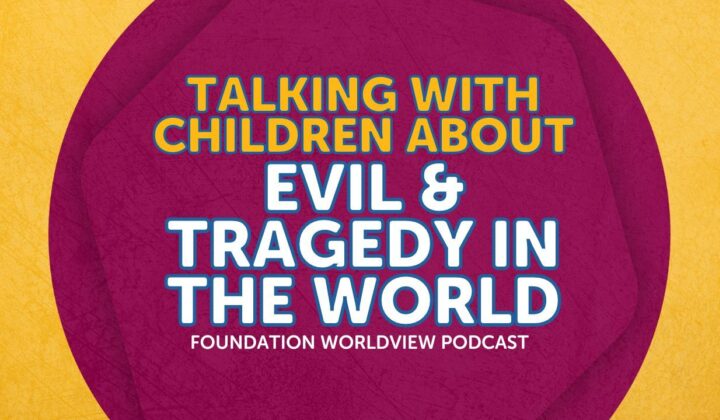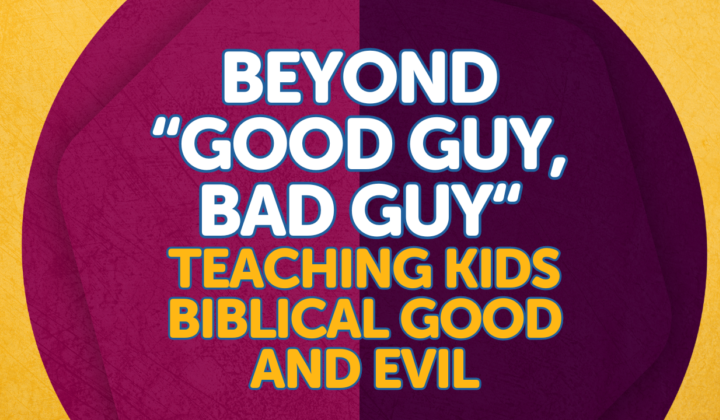Learn more about the journey that led to us equipping kids to carefully evaluate every idea they encounter.
Meet members of our team who have contributed to curriculum development.
Hear from real users of the Foundation Curriculum.
Learn what we believe about God, Jesus, Scripture, and more.
Why Did God Create Satan if He Knew He Would Rebel?
In this episode of the Foundation Worldview Podcast, Elizabeth Urbanowicz addresses a profound question from an 8-year-old: "Why did God create Lucifer if He knew Lucifer would rebel?" Elizabeth walks listeners through how to respond when children ask tough questions about God's plan and the existence of evil. She explains how to affirm a child’s curiosity, discern the root of their question, and guide them in biblical truths about God's character. With Scripture as the foundation, Elizabeth encourages parents to help their children understand that, while we may not know all the answers, we can trust in God’s goodness and His ultimate plan for redemption. Tune in for practical guidance and recommended resources for deeper exploration.
Transcript
Note: The following is an auto-transcript of the podcast recording.
Today's podcast question says, “My 8-year-old asked me why God created Lucifer as the most beautiful angel if He knew Lucifer was going to revolt. Thanks for your help with this.” What a great question! Here at Foundation Worldview, we love when children ask deep questions because it shows they’re thinking critically—and that’s exactly what we want for our children. We want them to learn how to think critically and biblically. So today, we’re diving into this big question together.
Now, before we get into the details of the question, I want to briefly talk about how we should respond any time our children ask deep questions. The first thing we want to do is affirm their curiosity. We want our children to know that their questions matter and that we’re a safe place for them to bring their thoughts. So, when a child asks a faith-related question, we can say something like, “Wow, that’s such a good question! I’m so glad you’re thinking about this.”
The second thing we want to do is stay calm if we don’t know the answer. Sometimes our kids ask questions that catch us off guard, and it’s okay to say, “You know what? I don’t know the answer, but let’s find out together.” We don’t need to panic, and we definitely shouldn’t make something up just to sound confident. Why? Because honesty matters. If we make something up and they later find out it wasn’t true, it can damage their trust—not just in us, but also in the truth we’re trying to teach. Modeling how to seek solid answers is actually more valuable than having all the answers off the top of our heads.
One great resource for answering questions about faith and the Bible is GotQuestions.org. They’ve answered tens of thousands of apologetics-related questions, and even if they don’t have the exact answer to your question, they can point you to helpful Scripture and other resources.
Now, let’s get into the question: “Why did God create Lucifer as the most beautiful angel if He knew he would rebel?”
Before we answer this question directly, it’s important to clarify what we’re teaching our children about Scripture. The name Lucifer is commonly used for Satan, but it only appears in the King James and New King James versions of the Bible, and even then, it’s only found in one verse—Isaiah 14:12. The original Hebrew word in that verse is “helel,” which means “light-bearer.” Most modern translations use terms like “Morning Star” or “Daystar.” The name Lucifer became popular largely because of John Milton’s famous work Paradise Lost, where Lucifer is a central character.
Why am I bringing this up? Because when we teach our kids, we want to make sure that what we’re teaching comes from Scripture and not cultural traditions or literary references. There are passages in Isaiah 14 and Ezekiel 28 that some scholars believe refer to Satan, but there’s debate about that. These passages are prophecies directed at earthly kings—the king of Babylon and the king of Tyre—but some theologians believe they also allude to Satan’s fall.
What we do know for certain from Scripture is that Satan is “the serpent of old” who deceived Adam and Eve in the garden and that he is both God’s enemy and our enemy. These are truths clearly revealed in Scripture. But we want to be cautious about presenting information as definite fact when Scripture doesn’t give us all the details.
So, how do we respond to a child who asks, “Why did God create Lucifer knowing he would rebel?”
The first thing we should do is get to the heart of the question. We can say something like, “That’s such a good question! Can you tell me more about why you’re thinking about this?” This helps us understand what’s behind their question. Sometimes kids are just curious about facts, but often the deeper question is something like, “Why does God allow bad things to happen?” or “Is this really the best plan?” Understanding the heart behind their question helps us address not just the surface-level inquiry but also their deeper wonderings about God’s goodness.
Once we’ve done that, the next step is to discuss what Scripture reveals—and what it doesn’t. Some things in Scripture are very clear, some things are debated, and some things are simply not revealed to us. A great way to start is by reviewing key attributes of God from Scripture.
Here are some helpful verses you can walk through with your child:
- Psalm 147:5 — “Great is our Lord and abundant in power; His understanding is beyond measure.” This verse shows that God is omnipotent (all-powerful) and omniscient (all-knowing).
- Psalm 145:9 — “The Lord is good to all, and His mercy is over all that He has made.” This verse reveals that God is good and merciful.
- Lamentations 3:22 — “The steadfast love of the Lord never ceases; His mercies never come to an end.” This reminds us that God is loving and merciful.
- 1 Samuel 2:2 — “There is none holy like the Lord; there is none besides you.” This verse emphasizes that God is holy and completely set apart.
After reading these passages, ask your child, “What do we know about God from these verses?” We know that God is powerful, He knows everything, He is good, He is loving, and He is holy. Then you can point out what we don’t know. We don’t know why God chose this specific plan or why He allowed rebellion to happen. But because of what Scripture reveals about who God is, we can trust that He is good and His plan is for our ultimate good.
Romans 8:28–29 is a powerful reminder of this: “And we know that for those who love God, all things work together for good, for those who are called according to His purpose. For those whom He foreknew, He also predestined to be conformed to the image of His Son.”
Even though we may not understand every detail of God’s plan, we can trust that He is working all things—yes, even the hard things—for the good of those who love Him. His ultimate purpose is to conform us more and more into the image of His Son, Jesus.
If your child continues to wrestle with this question, that’s okay. The problem of evil—understanding why God allows bad things to happen—is a big topic and an important one. For parents wanting to dig deeper into this, I highly recommend the book Why Does God Allow Evil? by Dr. Clay Jones. It’s thorough but accessible and presents a compelling case for why God allows free will and suffering.
If you’re looking for something to go through with your child, I recommend our “Mommy, Why Does God Let Bad Things Happen?” blog series. It’s designed to be read alongside your child and helps them process these questions in a thoughtful, age-appropriate way. We’ll make sure to include a link in the show notes so you can access it easily.
That’s a wrap for today’s episode! If you have a question you’d like me to answer on a future podcast, you can submit it at FoundationWorldview.com/podcast.
As we close, my prayer for you is the same as always: that no matter the situation you and the children God has placed in your care find yourselves in, you would trust that God is working all things together for your good by conforming you more into the image of His Son.
See you next time!
Related Posts and insights

Talking to Children about Evil and Tragedy in the World
Today's question says, "With all of the school shootings and other evil things that happen around us, how do you recommend talking with children about them? What age do you think is appropriate and how do you best frame this to point to God?"

Beyond Good Guy, Bad Guy: Teaching Kids Biblical Good and Evil
Today's question says, "I'm struggling to explain morality and the gospel to my five-year-old in fairytales. She often categorizes characters into all good or all bad, and I don't think it should be as simple as be good like Cinderella. Do you have any advice?"

Part 1: Mommy, Why Does God Let Bad Things Happen?
Sometimes you might wonder, “If God is good, why does He let bad things happen?” That is a great question, and it is a question many people have asked before.




